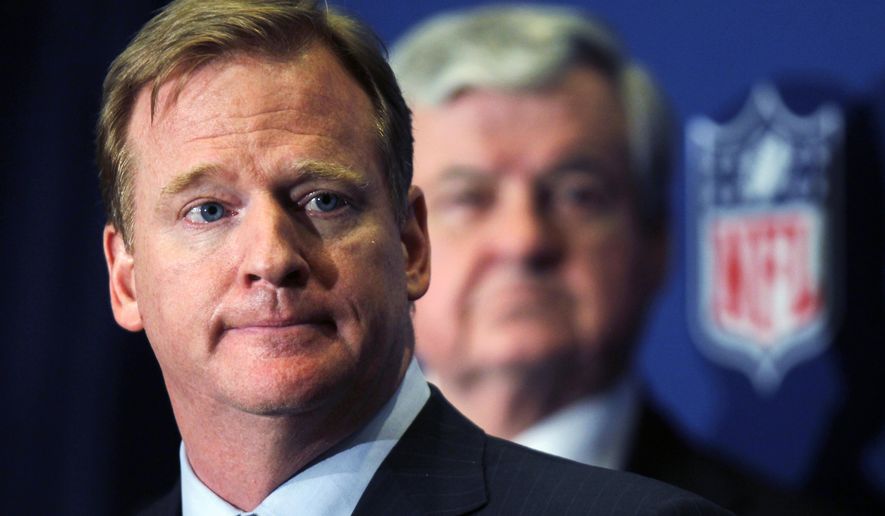Thursday marks the deadline for the NFL to comply with a request from two House Democrats to turn over all documents related to the league’s investigation into the Washington Football Team’s workplace misconduct.
But as of Wednesday afternoon, the league had yet to do so, according to an official from the House Oversight and Reform Committee. NFL Commissioner Roger Goodell said last week that the league would “be cooperative” with the congressional request. An NFL spokesman did not respond to an email asking if the league planned to turn over the documents.
That Congress would even be interested in the handling and findings of the NFL’s investigation into Washington’s workplace isn’t unheard of, according to numerous legal scholars.
Marc Edelman, a professor of law at Baruch College in New York, said Washington has a “track record of involving itself in … sports that extends upwards of 100 years” — citing President Theodore Roosevelt’s efforts to examine the safety of college football in the early 1900s through congressional inquiries in the 1950s into Major League Baseball’s antitrust exemptions to hearings in the 2000s on steroid use.
“Sports is an important part of American society,” Edelman said. “In certain ways, sports businesses enjoy unique advantages, including partially publicly funded stadiums. And with the prominence that commercial sports play in today’s society, it is not surprising that alleged wrongdoing in the world of professional organized sports has captured the attention of certain legislators.”
Last month, two members of Congress — House Democrats Carolyn B. Maloney of New York and Raja Krishnamoorthi of Illinois — sent the league a nine-page letter seeking more details on the investigation of sexual harassment allegations inside the Washington franchise after leaked emails from the probe led to Las Vegas coach Jon Gruden’s resignation.
The lawmakers asked for all documents related to the investigation, as well as answers to a number of questions.
In July, the league fined the Washington Football Team $10 million for its “very toxic” workplace but did not release a written report — citing privacy concerns.
This is hardly the first time the NFL has had to respond to members of Congress. In 2013, Commissioner Roger Goodell wrote a letter defending the nickname of the then-Redskins to 10 lawmakers calling for the team and the league to change the name.
Four years before that, Goodell testified in front of a congressional committee over concussions in football.
Ellen Zavian, a sports law professor at George Washington University, said the “Me Too” nature of the allegations into Washington’s workplace likely contributed to Congress’ intervention of the matter. She said the issues extend beyond the world of sports and into the workplace.
“I know the average person would believe that Congress has more things to do,” Zavian said. “But I think this is part of their job — to protect people that perhaps don’t have a voice.”
College sports have also drawn the attention of lawmakers. In June, a Congressional hearing was held to discuss a proposed federal law that would create a consistent set of rules to enable collegiate athletes to profit from the use of their names, images and likenesses.
Baseball is another sport that has frequently has had to deal with Congress. Unhappy over steroid use in baseball, lawmakers famously filed subpoenas in 2005 that required league officials and former athletes to testify about the issue.
Martin Edel, the chair of Goulston & Storrs Sports Law Practice and a lecturer at Columbia Law School, noted the outrage from Congress when the league explored contracting two teams in 2001.
Edel said Congress has a “perfectly legitimate right” to look into a league’s practices, citing the public interest at hand. He said Congress will often demand more information to determine whether further action is needed.
Zavian and others pointed to the number of existing laws in place that allow sports leagues to benefit — such as antitrust exemptions — as another reason that Congress often takes an interest in the world of sports.
“The antitrust (laws) hovers over all these leagues in some capacity,” she said.
If the NFL does not fully cooperate with Congress’ request, it remains to be seen what will happen next. Experts mentioned the possibility of subpoenas and public hearings could be used to put a bigger spotlight on the issue. Lisa Banks, a lawyer for the 40 former Washington employees who participated in the league’s investigation, told ESPN her clients would be prepared to testify if called on.
The NFL, of course, could always respond. Even then, it’s not quite clear what will the members of Congress will do after.
“The NFL has publicly stated its commitment to transparency, and the Committee expects the League to comply with this investigation,” a spokesperson for the House Oversight and Reform Committee said. “The committee will wait until the NFL has had a chance to respond to its request before determining next steps.”
• Matthew Paras can be reached at mparas@washingtontimes.com.




Please read our comment policy before commenting.